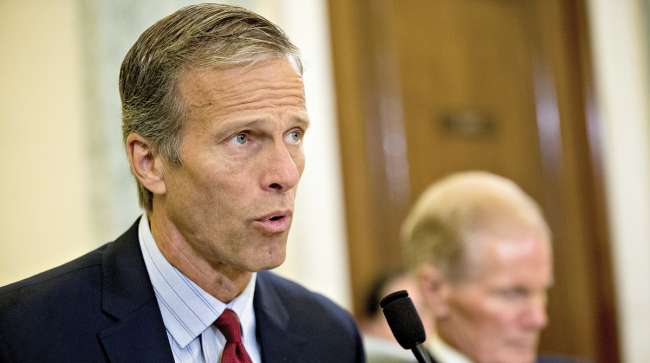Senior Reporter
Thune, Key Transportation Senators Fill GOP Leadership Roles

[Stay on top of transportation news: Get TTNews in your inbox.]
WASHINGTON — Familiar faces in the transportation community were selected to manage the U.S. Senate as Congress readies for its final legislative sprint of the year.
Sen. John Thune (R-S.D.), chairman of the Commerce Committee on freight policy during President-elect Donald Trump’s first term, will ascend to the chamber’s top leadership role in January after a majority of his caucus on Nov. 13 showed him their support. Thune will succeed Sen. Mitch McConnell (R-Ky.) as the caucus’ leader and Sen. Chuck Schumer (D-N.Y.) as majority leader.
Thune’s tenure as a member of the Senate’s Republican leadership includes the passage of bills designed to improve supply chain connectivity and improve safety and efficiency along freight corridors. The South Dakota senator joined senior Democrats on the freight panel to successfully advance the Ocean Shipping Reform Act. Enacted into law in 2022, the measure reinforced operations at the Federal Maritime Commission to respond to supply chain concerns.
Following the caucus’ announcement, Thune explained the Republican team in the Senate would pursue Trump’s policies as well as assist with the confirmation of his top-level nominees. As he put it, “We will make sure that the president and his team have the tools and support that they need to enforce border security laws and to remove the violent criminals who are wreaking havoc in every one of our states.
“We will work to make America prosperous again by streamlining the bureaucratic machine and overturning costly Biden-Harris [administration] regulations. And we will work to restore American energy dominance — not just our energy security, but energy dominance — which will lower costs and bolster our national security.” He also signaled the potential for reaching bipartisanship on certain policy bills.
Thank you, President Trump. I’m ready to roll up my sleeves and get to work. pic.twitter.com/mqg2OYODzZ — Senator John Thune (@SenJohnThune) November 14, 2024
Rounding out Senate Republicans’ leadership circle are Sens. John Barrasso of Wyoming, Tom Cotton of Arkansas, Shelley Moore Capito of West Virginia, James Lankford of Oklahoma and Tim Scott of South Carolina. Barrasso and Capito hold leadership roles on policy panels directly linked to the commercial transportation sector.

Capito
“With President Trump back in the White House and a Republican-led Congress, we have the responsibility to promote and advance conservative, Republican policies within our conference,” Capito said on Nov. 13. “I look forward to working in this new leadership role to help build consensus with my colleagues in many of these conservative principles that Senate Republicans — now in the majority — can implement in the new Congress.”
Capito is the ranking member on the Environment and Public Works Committee on surface transportation policy. Next year, the committee will be tasked with kicking off negotiations on comprehensive highway policy legislation.
Before Thune and his colleagues begin their leadership tenure in January, Congress is expected to wrap up an already busy post-election lame duck session. With federal funding approval expiring Dec. 20, a priority for congressional leaders is passing a fiscal 2025 funding package that would avert a shutdown. Key lawmakers also are advocating for the inclusion of billions of dollars to assist states recovering from natural disasters. The aid would assist with the rebuilding of Baltimore’s Francis Scott Key Bridge, which collapsed in March.
Senate Appropriations Committee Chairwoman Patty Murray (D-Wash.), pressing for passage of the funding bill for the Department of Homeland Security, addressed both points. “We still need to negotiate a major, bipartisan disaster relief supplemental to help communities in every part of this country rebuild,” she said Nov. 13. “I look forward to working with my colleagues on both sides of the aisle to get this bill passed into law before the end of the year.”
Thank you, President @realDonaldTrump for joining House Republicans this morning.
Our strong @HouseGOP majority is looking forward to advancing your agenda that puts the American people FIRST!
As you said, we will unify and get it done! 🇺🇸 pic.twitter.com/9lBOg5s8rK — Speaker Mike Johnson (@SpeakerJohnson) November 13, 2024
House Speaker Mike Johnson (R-La.), who recently won the backing from his caucus to remain in his leadership role, said he will detail a fiscal 2025 funding strategy after an upcoming meeting with the president-elect. Looking ahead to next year, the speaker affirmed, “It’s clear the American people do want secure borders. They want to prevent terrorists and criminals from entering the country. These things are common sense.

Johnson
“They want and deserve lower costs for groceries and gasoline. They want us to project strength on the world stage again and not the weakness that we have projected for the last four years. They want an end to the wokeness and the radical gender ideology and a return to common sense in our children’s classrooms and corporate boardrooms and government agencies. And we’re going to ensure all that’s true.”
The White House is requesting about $3 billion for rebuilding the Francis Scott Key Bridge. It also is seeking congressional approval for nearly $1 billion to assist regions affected by natural disasters.
Before the elections, the Senate Appropriations Committee approved a transportation bill that would provide $964.5 million for the Federal Motor Carrier Safety Administration during fiscal 2025. A House committee-passed version of the legislation would provide FMCSA with $909 million. The House measure also includes $200 million for truck parking expansion projects nationwide. The final versions of fiscal 2025 government funding bills await votes on the floor of the chambers.
Want more news? Listen to today's daily briefing below or go here for more info:




